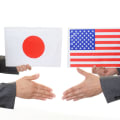Dali Every language adopts words from other languages. As you know, the Japanese language has many loan words (gairaigo) from English. In addition to English, there are many gairaigo that come from Portuguese or Spanish. These are usually food. For example, tempura, which, I think, comes from Portuguese.
ダリちゃん どんな言語でもよその言語からの単語を取り入れている。知っての通り、日本語には英語からの外来語がたくさんある。英語だけじゃなくポルトガル語やスペイン語から来た外来語もたくさんある。大体、食べ物だけどね。たとえば「てんぷら」。ポルトガル語から来ていると思うよ。
Me Oh, really? How about in English?
私 へー、本当? 英語の場合はどうなの?
Dali Of course, English has a few loan words from Japanese, like karaoke and karate. But extremely shocking to me is the incredible number of English gairaigo in the Japanese language. It’s simply unbelievable! And this is a phenomenon which I find very interesting.
ダリちゃん もちろん、英語にも、日本語から来た外来語はいくつかはあるよ。たとえば「カラオケ」や「カラテ」など。でも、わしにとって無茶苦茶びっくりするのは、日本語にはおびただしいほどの英語から来た外来語があるということだ。もう単純に信じられないね! わしはこのことはとても興味深いことだと思うんだけど。
Me Ho! Ho!
私 ほ、ほう!
Dali It seems to me that Japanese must have more loan words than any other language. I wonder why. Some people say that this is because all Japanese people study English, so there are a lot of people knowledgeable of English vocabulary. But I don’t think it is the reason because other countries are the same in respect to English education. In Russia, China, Holland, and other countries, they also study English, but they don’t have nearly as much English gairaigo as Japanese does.
ダリちゃん 日本語は他のどの言語より外来語を多く含む言語じゃないかなと思えるね。なぜだろう? 日本人すべてが英語を勉強するので、英語の語彙に精通した人が多いことがその理由だという人がいる。でもわしはそうは思わないね。だって他の国も英語教育という点では同じだもの。ロシア、中国、オランダやその他の国でも英語を勉強するよ。でも日本に比べれば、英語の外来語は全く多くない。
Me Curiouser and curiouser!
私 ますます奇妙、奇妙だわ!
Dali I think one possible reason why there are so many gairaigo from English in Japanese might be that Japan was recently occupied by the US.
ダリちゃん 日本語に非常にたくさんの英語からの外来語が存在する一つの可能性がある理由として、日本が少し前までアメリカに占領されてたことが挙げられると思うんだ。
Me Interesting…
私 おもしろいけど……
Dali I will tell why I think so. Let’s put the Japanese gairaigo story aside. Did you know that English is heavily influenced by the French language? Seventy percent of commonly-used English vocabulary is of French origin.
ダリちゃん なぜそう思うのか教えてあげよう。日本語の外来語のお話はちょっと置いといて、あなたは、英語がフランス語の影響を強く受けているということを知ってた? 日常的に使われる英語の語彙の70%はフランス語由来なんだ。
Me Oh, I didn’t know that!
私 へー、知らなかった!
Dali There is a very logical reason for this. Long ago, the French waged war on England. The French won and proceeded to occupy England for hundreds of years. This was known as the Norman Conquest (1066). From this point, for literally hundreds of years, the French controlled the government, the law, and the culture of England. Naturally, French words trickled down to the common English people and into their English language.
ダリちゃん これには、ちゃんと筋の通った理由があるんだ。ずっと昔、フランス人はイギリスに戦争を仕掛けたんだ。フランス人が勝利して、何百年もの間イギリスを支配したんだ。これはノルマン征服として知られている。その時から、文字通り何百年もの間、フランス人はイギリスの政府、法律、そして文化を支配したんだ。当然のことだけど、フランス語は一般のイギリスの国民に浸透し、英語にも浸透していったんだ。
Me I didn’t know that!
私 知らなかった!
Dali I also know that Japanese is heavily influenced by the Chinese language. Look at these kanjis in the Japanese book that I have in my hand! Do you know 70% of commonly-spoken Japanese is of Chinese origin?
ダリちゃん 日本語は中国語の影響を強く受けていることも知ってるよ。わしが手にしている日本の本を見てごらん。「漢字」だらけだろう? 日常的に話される日本語の70%は中国語由来だってこと知ってる?
Me Seventy percent? Wow!
私 70%も? 嘘だあ!
Dali It’s true! Even though Japan has never been occupied by China…
ダリちゃん 本当だよ! 日本は中国に占領されたことが無いにもかかわらずだよ。
Key words(キーワード)
prevalence: 広く行き渡っていること、普及、流行
adopt: 採用する、取り入れる
incredible: 信じられない、信用できない、驚くべき
curiouser and curiouser: いよいよ(ますます)奇妙な(「不思議の国のアリス」のアリスの言葉から)
wage war: 戦う、闘う、戦争する
trickle down: ポタポタ落ちる、滴り落ちる
subsequent: その次の、続いて起こる、あとの
huge: 巨大な、莫大な、大きい
Comments(コメント)
I was surprised to hear that war and the subsequent occupation can have a huge impact on the language of an occupied country.
僕は、戦争とそれに続く占領が、被占領国の言語に多大な影響を及ぼしうることを聞いてびっくりした。
※Title photo: Bayeux tapestry‒Norman invasion of England






















